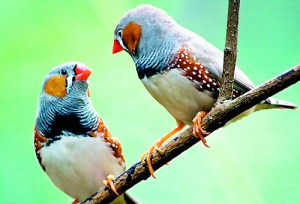Sunday Times 2
How animals talk
Whale song, wolf howls, frog croaks and bird chirps are complex forms of communication – just like human speech, according to new research.

Love birds: Scientists conducting the study looked for evidence of Markovian noises in the noises made by seven creatures - chickadees, finches (pictured), bats, orangutans, killer whales, pilot whales, and hyraxes (CC BY 2.0 'Zebra Finches' by NeilsPhotography)
These creatures may not be able to master advanced language techniques, but their unique calls are much more than just random noises, a study shows.
The ‘speech’ of seven different species of birds and mammals found they appear to be generated by processes similar to how we speak.
The mockingbird, for example, can mimic more than 100 distinct song types of different species, and the long string of wails and snorts of the from a rock hyrax – a type of badger – signify male territory.
The study suggests there may be a ‘missing link’ on the path from animal communication to human language that has not yet been found.
‘Multiple studies are finding more and more stepping stones that seem to bridge this gap,’ said Dr Arik Kershenbaum, from the National Institute for Mathematical and Biological Synthesis in Knoxville, Tennessee.
Dr Kershenbaum said uncovering the process could help scientists understand the origin of human language. But while the vocalisations suggest language-like characteristics, scientists have found it difficult to figure out the complexity.
Typically, they have assumed the sequence of animal calls is generated by a simple event called a ‘Markov process’, named after a Russian mathematician eighty years ago, which is dependent on what happened last. Animal calls are said to be restricted by rigid Markovian rules of ‘regular’ grammar that have a set sequence.
Human language, in contrast, uses what are called ‘context-free grammars’ that apply the same set of rules in different ways, making it much less predictable.
© Daily Mail, London

